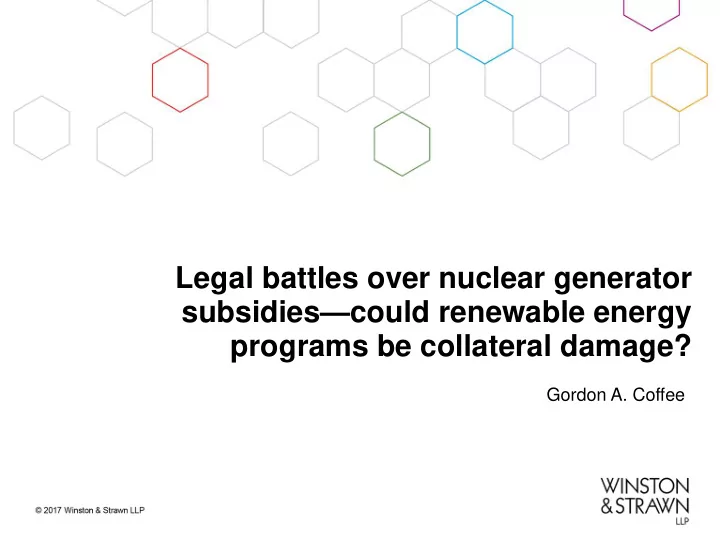

Legal battles over nuclear generator subsidies—could renewable energy programs be collateral damage? Gordon A. Coffee
Impetus for Zero-Emission Credit programs • Deregulated nukes in New York and Illinois primarily rely on dispatch by NYISO, PJM, or MISO • Nukes’ marginal costs higher than natural gas plants’ or renewables’ • Tax subsidies give renewables competitive advantage in day-ahead and real time markets • Nukes receive insufficient revenues from capacity auctions • Nuke owners threatening to shut down plants
No help for nukes from FERC, RTOs or ISOs • FERC only held technical conference on potential market design changes • Most RTOs and ISOs not ready to alter their markets to compensate nukes for zero carbon emissions or reliability • Dispatch still based on lowest cost units • NYISO considering integrating carbon adder into pricing model • PJM proposing two-part capacity auctions to offset subsidies
New York and Illinois take action • Implemented ZEC programs in 2016 • States feared loss of high-paying jobs, reduced grid reliability, and increased CO2 emissions and air pollution if nukes shut down • States tried to provide support in a way that did not run afoul of Hughes v. Talen Energy Marketing • ZEC program packaged with enhanced renewable energy program
Features of ZEC programs • Plants paid for producing power with no carbon emissions • ZECs similar to Renewable Energy Credits • LSEs/utilities must purchase set amount of ZECs • Nukes sell ZECs • State agency in the middle in NY, not in Illinois • Price of ZECs determined by state, not markets • Price tied to social cost of carbon, less average price of energy in RTO/ISO
Legal challenges • Owners of natural gas-powered plants filed suit to block the ZEC programs in NY and Illinois • Theories • ZEC program invades FERC’s exclusive jurisdiction to set wholesale energy rates (preemption) • ZECs distort wholesale energy and capacity markets (preemption) • ZEC program discriminates against out-of-state generators (dormant Commerce Clause)
Preemption • Hughes --Supreme Court rejected Maryland subsidy for new generation • Program required generator to clear PJM capacity market • Maryland effectively overrode PJM price by providing price guarantee • Debate whether ZEC programs require nukes to participate in wholesale energy markets • Debate whether ZEC programs interfere with functioning of wholesale markets
Commerce Clause • Are ZEC programs intended to discriminate against out-of state generators or preserve environmental benefits of nukes? • Are out-of-state nukes eligible for ZECs? • Do plaintiffs have standing to complain?
Status of suits • Expect rulings in next few months • PJM supporting the Illinois plaintiffs • PJM Market Monitor supporting the New York plaintiffs • States and some environmental groups defending ZEC programs • MISO said Illinois suit premature • NYISO not participating in New York suit
Could renewable energy programs be at risk? • Plaintiffs, environmental groups, and wind association claim ZECs distinct from RECs • States say otherwise • Legality of renewable programs not settled • Sweeping ruling against ZECs could endanger RECs
Are renewable programs preempted? • Illinois and New York RPS programs not require participation in RTO or ISO markets • But generators must sell power to earn RECs • REC prices not directly tied to RTO or ISO prices • Yet “RECs markets are, as an economic fact, integrated with PJM markets including energy and Capacity markets, but are not formally recognized as part of PJM markets.”
Do RPS and REC mandates affect wholesale markets? • “[R]enewable energy mandates at both the federal and state levels have a significant impact on the cost of energy and capacity in PJM markets.” • Renewable energy credits and other subsidies “affect the offer behavior and the operational behavior of these resources in PJM markets and thus the market prices and the mix of clearing resources.” • “RECs clearly affect prices in the PJM wholesale power market. Some resources are not economic except for the ability to purchase or sell RECs.”
Do renewable energy programs violate the Commerce Clause? • 7th Circuit said Michigan RPS’ exclusion of out-of-state generators unconstitutional • Participation in Illinois and New York limited for most part to in-state green generators • In Illinois, new out-of-state generators can participate only if a state agency finds it to be in the public interest • In New York out-of-state generators must continually sell in New York from an adjacent RTO or ISO
Second Circuit Allco Finance decision • Upheld Connecticut renewable energy program • Connecticut does not compel utilities to buy renewable energy at price set by auctions • Utilities enter into bilateral contracts outside ISO • States not required to support renewables solely through PURPA • No violation of Commerce Clause • Generators from adjacent RTOs and ISOs can participate • Different REC products
Connecticut RPS and REC program distinguishable • State does not dictate contract terms • FERC reviews bilateral contracts between utilities and generators for reasonableness • Connecticut followed geographic boundaries set by FERC in deciding which generators could participate • Generators not required to clear through ISO auction
Fin
Recommend
More recommend